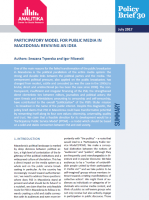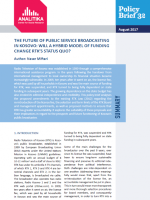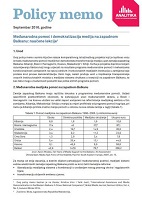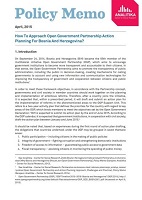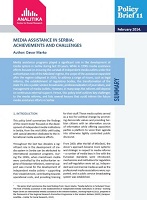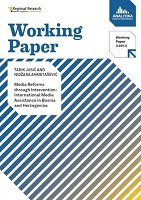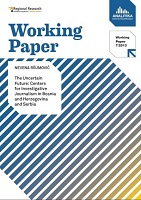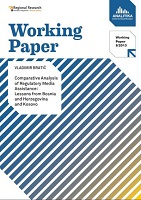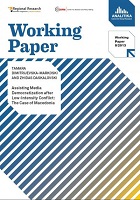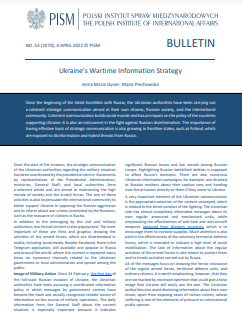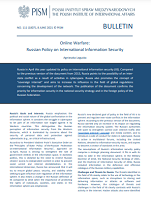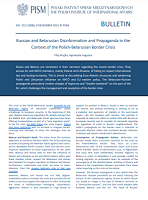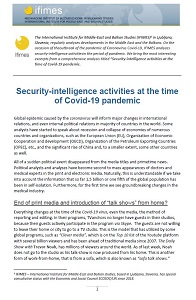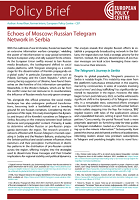Author(s): Nevena Ršumović / Language(s): English
In the past decade, independent nonprofit centers devoted to the production of investigative journalism according to the highest standards were established in the Western Balkans, joining a world-wide trend of investigative journalism migrating from mainstream media into specialized organizations. This study focuses on two such centers – one in Bosnia and Herzegovina (BiH) and one in Serbia - aiming to understand how such a model of an organization, successful primarily in the U.S, but also in several other places, can operate in the specific conditions of the media markets of the two countries. As the examined centers have as their role-models mainly similar centers in the U.S, the question is how applicable the U.S. nonprofit investigative journalism model is in the Western Balkan countries and are we, possibly, witnessing what Zielonka and Mancini dub “the opaque imitation of external models” referring to imported models that “have been put in practice in very different environments from those in which they originated”? Additionally, the study examines the role of the specifics of donor assistance in the Western Balkans on the operation and future of these two centers. While there are many definitions of investigative journalism, there is a broad understanding among professionals that its components are “systematic, in-depth, and original research and reporting, often involving the unearthing of secrets.” We could add that it covers issues which are in the public interest. It often entails heavy use of public records and data-driven journalism, and focuses on social justice and accountability. While some claim that all good reporting should be investigative, the reality is that methods of investigative reporting can take years to master. Kaplan warns that investigative journalism “should not be confused with what has been dubbed “leak journalism”– quick-hit scoops gained by the leaking of documents or tips, typically by those in political power,” which is a common case in the Western Balkans. Donors recognized the contribution of investigative journalism to accountability, development and democracy and included it in programs aimed at strengthening independent media, fighting corruption and promoting accountability, good governance and democracy. In the Western Balkans, donors have used three main approaches aimed at fostering development of investigative reporting. Attempts have been made to develop it by provision of trainings, through grants for investigative reporters, but also through the creation of nonprofit centers that specialize in investigative reporting as a response to various impediments to practicing it in the mainstream media. The development of investigative journalism nonprofits in the former communist countries of Central and Eastern Europe, including the region of the Western Balkans, was not only due to the lack of funding in the mainstream media, but “can also be seen as investigative journalism trying to deflect pressure from political, commercial or other special interests.” These independent, often non-profit centers are almost entirely dependent on donor funding. They use cutting-edge research methods, such as data driven journalism, publish mainly on the Internet, foster cross-border investigations, and seem to fill the void created among the traditional media. The question is, however, whether such centers in the Western Balkans are able to follow in the footsteps of successful examples abroad. Therefore, this exploratory study provides an analysis of two independent investigative journalism centers in Serbia and BiH dedicated to the production of investigative stories of the highest standards of Western journalism. The study is focused on the Center for Investigative Journalism Serbia (CINS), based in Belgrade, and the Center for Investigative Reporting (CIN), based in Sarajevo. While these centers resemble similar media operations in the Western countries of developed democracies, such as the U.S., this analysis examines the challenges that the two centers face in the context of their respective countries, such as dealing with shrinking international donor support and ensuring long-term self-sustainability, integration in the local media landscape and willingness by mainstream media to publish their stories so they can reach a wider audience in order to achieve policy impact. In order to answer these questions, the study first provides an overview of the trend of investigative journalism nonprofits and a brief analysis of the centers that CIN and CINS used as their role-models. Second, it outlines the problems in the media landscapes of BiH and Serbia which have an impact on investigative journalism. It then offers an overview of the assistance to investigative reporting in the two countries, followed by in-depth case studies of the two selected centers, based on interviews with their managers, funders and independent media experts. Finally, it provides a conclusion of the findings pertaining to the success in transposing the models upon which the centers were established and key contextual factors that influence their operation and perspectives for sustainability.
More...
